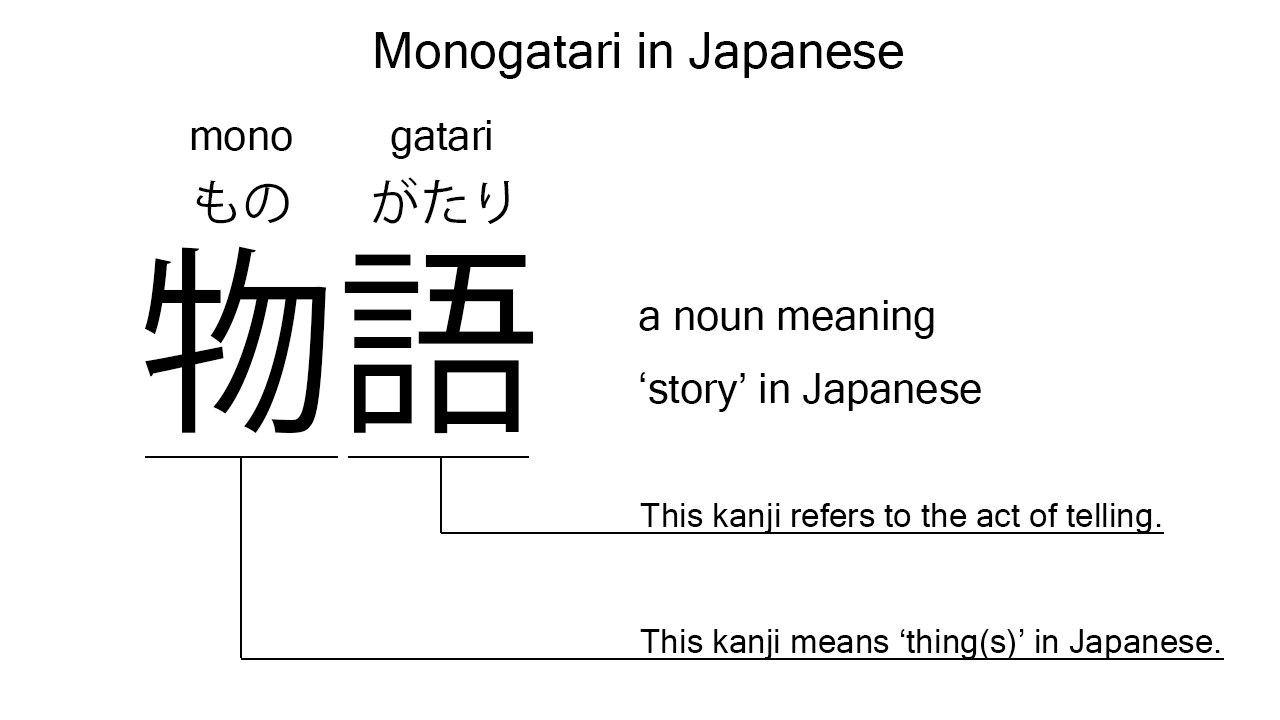What does “monogatari” mean in Japanese?
Native speakers say “monogatari” often to mean ‘story’ in Japanese. Perhaps, some Japanese learners know this word as it is sometimes used in Japanese movies, songs, novels, manga, anime, and the like. In this blog post, however, I will explain this word in detail based on its kanji expression. And also, I will explain how to use it through example sentences. My explanations would help Japanese learners understand “monogatari” more clearly. Then, let’s get started!
Contents
Definition and meanings of “monogatari”
Let me start with the definition and meanings of “monogatari”.
- monogatari – 物語 (ものがたり) : a noun meaning ‘story’, ‘tale’, ‘narrative’, or such in Japanese. This can also work as plural. Learn more about Japanese plural.
The definition and meanings are not that difficult, I think. To understand this noun more clearly, however, let me explain its kanji characters in detail, one by one.
What does “monogatari” literally mean in Japanese?
The kanji expression of “monogatari” consists of the following two kanji characters:
- 物 : a kanji character widely used to mean ‘thing’, ‘stuff’, ‘event’, or such in Japanese.
- 語 : a kanji character widely used to refer to the act of telling or speaking.
From these two kanji characters, we can understand that “monogatari” literally means ‘things to be told’ in Japanese. This literal interpretation is not completely in line with the actual meanings, but still very close, I think. Stories are more or less things to be told.

When we meet new kanji expressions, we should check their kanji characters in detail to understand their meanings clearly and deeply. In many cases, kanji characters tell us a lot about the meanings of the words they form. Actually, here, we could get the better understanding of “monogatari” through the detailed kanji check above.
So far, I’ve explained the definition and meanings of “monogatari” together with its kanji characters. Then, let me explain how to use it through the example sentences below.
Example #1: how to say “story” in Japanese
boku wa kono monogatari ga suki desu – 僕はこの物語が好きです (ぼくはこのものがたりがすきです)
I love this story.
Below are the new words used in the example sentence.
- boku – 僕 (ぼく) : a pronoun meaning ‘I’ in Japanese. This is used mainly by boys and young males.
- wa – は : a binding particle working as a case marker or topic marker. In the example, this works after “boku” to make the subject in the sentence.
- kono – この : a determiner used before a noun which refers to something close to the speaker. In the example, this is used before “monogatari” to mean ‘this story’ in Japanese.
- ga – が : a case particle used to make the subject word or the object word in a sentence. In the example, this is used after “kono monogatari” to make the object in the sentence.
- suki – 好き (すき) : the stem part of the na-adjective, “sukina”, which means ‘favorite’ in Japanese. Native speakers, however, often use this as an individual word to mean ‘to like’ or ‘to love’ in Japanese. In the example, this is used to mean ‘to love’.
- desu – です : an auxiliary verb used after a noun or adjective to make it polite. Probably, this is well known as a part of Japanese desu form. In the example, this is used after “suki” to make it sound polite.
This is a typical usage of “monogatari”. In this example, it works together with the determiner, “kono”, to mean ‘this story’ in Japanese.
Example #2: another usage of “monogatari”
tokuni monogatari no hajimari ga totemo yokat ta – 特に物語の始まりがとても良かった (とくにものがたりのはじまりがとてもよかった)
Especially, the beginning of the story was really good.
Below are the new words used in the example sentence.
- tokuni – 特に (とくに) : an adverb meaning ‘especially’ in Japanese.
- no – の : a case particle joining two nouns. Normally, the first one can work as a modifier to describe the second. In the example, this works to join “monogatari” and “hajimari”. The formed phrase literally means ‘the beginning of the story’ in Japanese. Word orders in Japanese and English are different, but the role of this case particle is similar to that of the English preposition, “of”.
- hajimari – 始まり (はじまり) : a noun meaning ‘beginning’ or ‘start’ in Japanese.
- totemo – とても : an adverb of degree meaning ‘very’, ‘much’, ‘so’, or such in Japanese. In the example, this works before “yokat ta” to emphasize its meaning.
- yokat – 良かっ (よかっ) : one conjugation of the i-adjective, “yoi“, which means ‘good’ in Japanese. In the example, it has been conjugated for the better connection with its following word.
- ta – た : an auxiliary verb used after a verb, adjective, or auxiliary verb to make its past tense form. Probably, this is well known as a part of Japanese ta form. In the example, this is used after “yokat” to make its past tense form.
This is another typical usage of “monogatari”. In the example, it works together with “no” and “hajimari” to mean ‘the beginning of the story’ in Japanese. When we want to mean a ‘story’ in Japanese, anyway, this noun is always a very good option.
Summary
In this blog post, I’ve explained the definition and meanings of “monogatari” in detail based on its kanji expression. And also, I’ve explained how to use it through the example sentences. Let me summarize them as follows.
- monogatari – 物語 (ものがたり) : a noun meaning ‘story’, ‘tale’, ‘narrative’, or such in Japanese. This can also work as plural. These two kanji characters literally mean ‘things to be told’ in Japanese. This literal interpretation is not completely in line with the actual meanings, but still very close, I think. Stories are more or less things to be told.
Hope my explanations are understandable and helpful for Japanese learners.